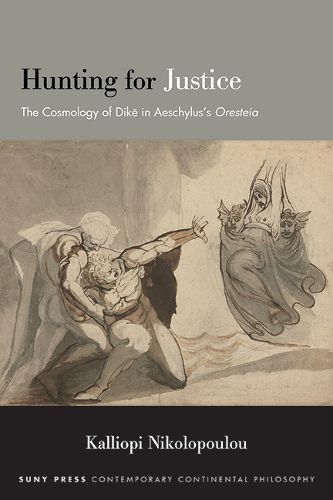Readings Newsletter
Become a Readings Member to make your shopping experience even easier.
Sign in or sign up for free!
You’re not far away from qualifying for FREE standard shipping within Australia
You’ve qualified for FREE standard shipping within Australia
The cart is loading…






Utilizes Greek tragedy to investigate the fundamentally arbitrary and violent nature of justice.
A purely political understanding of justice does not convey the cosmological origins of the ancient conception of justice, Dike, in Aeschylus's Oresteia. Drawing from Walter Burkert's anthropology of the hunt in Homo Necans, which articulates an ancient cosmology and implies a theory of (tragic) seriousness that parallels Aristotle's naturalist interpretation of tragedy, Hunting for Justice argues that justice is rooted in predation as exemplified by the Furies. Although the Oresteia has been read as the passage from the violence of nature to civic justice, Kalliopi Nikolopoulou offers an original interpretation of the trilogy: the ending of the feud is less an instance of political deliberation (as Hegel maintained), and more an instance of nature's necessary halting of its own destructiven'ess for life to resume. Extending to contemporary contexts, she argues that nature's arbitrariness continues to underpin our notions of justice, albeit in a distorted form. In this sense, Hunting for Justice offers a critique of the political infinitization and idealization of justice that permeates our current discourses of activism and social justice.
$9.00 standard shipping within Australia
FREE standard shipping within Australia for orders over $100.00
Express & International shipping calculated at checkout
Utilizes Greek tragedy to investigate the fundamentally arbitrary and violent nature of justice.
A purely political understanding of justice does not convey the cosmological origins of the ancient conception of justice, Dike, in Aeschylus's Oresteia. Drawing from Walter Burkert's anthropology of the hunt in Homo Necans, which articulates an ancient cosmology and implies a theory of (tragic) seriousness that parallels Aristotle's naturalist interpretation of tragedy, Hunting for Justice argues that justice is rooted in predation as exemplified by the Furies. Although the Oresteia has been read as the passage from the violence of nature to civic justice, Kalliopi Nikolopoulou offers an original interpretation of the trilogy: the ending of the feud is less an instance of political deliberation (as Hegel maintained), and more an instance of nature's necessary halting of its own destructiven'ess for life to resume. Extending to contemporary contexts, she argues that nature's arbitrariness continues to underpin our notions of justice, albeit in a distorted form. In this sense, Hunting for Justice offers a critique of the political infinitization and idealization of justice that permeates our current discourses of activism and social justice.